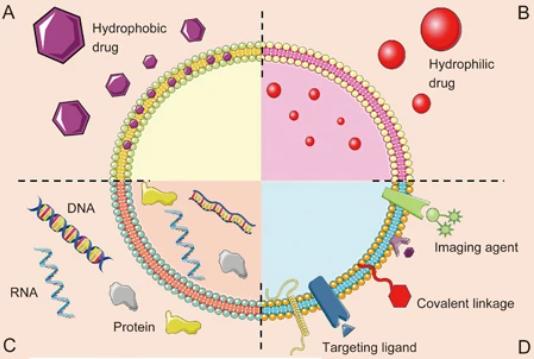Exosomes for Protein Delivery
Online InquiryProtein drugs have high activity, specificity, low toxicity and other advantages over small drugs. To date, the FDA has approved over a hundred protein drugs for various disease treatments. However, the delivery of proteins across the cell membrane is a challenge. Cellular impermeability is a major barrier to the intracellular delivery of recombinant proteins. Therefore, there is an urgent need to develop a universal protein delivery method. As natural carriers in cells, exosomes themselves carry various cargos, including proteins. Thus, exosomes are excellent carriers for the transport of a wide range of proteins.
Exosomes as vehicles for therapeutic proteins
Intracellular protein delivery is an enormous obstacle to its development into a universal therapy. Advances in intracellular protein delivery will facilitate the development of protein drugs. Exploiting exosomes for delivering macromolecular proteins has shown potential. Various studies have applied exosomes to the delivery of peptides and proteins, such as enzymes, cytoskeletal proteins and transmembrane proteins. There are two major methods of loading peptides or proteins into exosomes, including direct loading and indirect loading through genetic engineering of the donor cells. In the second method, donor cells are first transfected with a plasmid carrying the gene of interest. The protein encoded by the inserted gene is then synthesized in the cell and secreted into the exosomes. Finally, exosomes are isolated and purified by collecting cell culture supernatants.
 Fig. 1 Schematic representation of the different types of exosomes drug delivery systems. (Luan, Xin, et al., 2017)
Fig. 1 Schematic representation of the different types of exosomes drug delivery systems. (Luan, Xin, et al., 2017)
Advantages of exosomes as drug delivery systems
- As naturally transported nanovesicles, exosomes can be secreted by a variety of cell types.
- Exosomes are able to penetrate multiple biological barriers (such as the blood-brain barrier) due to their cell surface compounds.
- Exosomes can directly stimulate target cells and transfer membrane receptors between cells, therefore avoiding diffusion into tissues by phagocytes/ monocytes.
- Compared to synthetic delivery carriers, exosomes have excellent stability and lower cytotoxicity in vivo.
Creative Proteomics is committed to providing innovative solutions to power your biological research. We are proud to offer a series of exosome research and analysis services. Our capability can greatly promote the application of exosomes as carriers for protein delivery. In addition to scalable upstream production and isolation of exosomes, we offer downstream processing for efficient exosome characterization and labeling to obtain high-quality, functional exosomes that can be used for protein delivery.
| Exosome analysis services | |
|---|---|
| Exosome isolation and purification | Sucrose gradient centrifugation |
| Polymer-based exosome enrichment method | |
| Immunomagnetic bead method | |
| Size exclusion chromatography method | |
| Exosome identification | Nanoparticle tracking analysis (NTA) |
| Electron microscopy analysis | |
| Western blot | |
| Exosome marker assay | Isolation and enrichment of exosomal CD9, CD63, CD81, TSG101, HSP70 proteins |
| Exosome surface protein identification and quantitative analysis | |
| Exosome engineering | Exosome labeling and tracking |
| Cargo loading | |
| Engineered exosome production | |
| Cargo loading assessment | |
| Exosomes labeling and tracking | Exosome fluorescent labeling |
| Fluorescence exosome purification | |
| Fluorescent exosome concentration labeling | |
| Exosome multiomics analysis | Exosome proteomics analysis: Exosome protein profile identification Exosome protein composition analysis Exosome protein expression level analysis Exosome protein differential expression analysis |
| Exosome metabolomics analysis: Exosome differential metabolite screening Qualitative and quantitative analysis of target metabolites/metabolic pathways | |
| Exosome lipidomics analysis: Exosome lipid composition and level analysis Differential expression analysis of exosomal lipid molecules Qualitative and quantitative analysis of targeted lipid molecules | |
| Exosomal biogenesis and identification | Our capabilities will provide strong support for the study of exosome biogenesis and its identification. |
| Exosomal cargo and loading mechanism | Our services can greatly help the study of exosomal cargo and loading mechanism, facilitating the diagnostic and therapeutic applications of exosomes. |
| Exosome function research | In vitro analysis of the function of exosomes In vivo analysis of the function of exosomes |
Notably, our services include the above list but are not limited to them. If you are interested in our services, please contact us. Use our contact form for general inquiries. We will then forward your request to the right contact person.
Reference
- Luan, Xin, et al. "Engineering exosomes as refined biological nanoplatforms for drug delivery." Acta Pharmacologica Sinica 38.6 (2017): 754-763.
* For Research Use Only. Not for use in diagnostic procedures.



